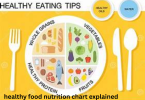If you’re looking for simple nutrition facts about fruits, you’ve come to the right place. Fruits are one of the easiest, tastiest ways to get nutrients your body needs. They’re colorful, naturally sweet, and packed with essential vitamins and minerals. But, just like everything, fruits have a few things to watch out for. Let’s dive in, step by step, so you can eat smarter without stress.
Why Fruits Are Important

Fruits are more than just tasty snacks—they are essential for maintaining a healthy body and mind. Here’s why:
- Rich in Vitamins and Minerals: Fruits are full of vitamins like C, A, and K, plus minerals like potassium and magnesium. These nutrients help your body function properly.
- High in Fiber: Fiber helps with digestion, prevents constipation, and even supports heart health.
- Natural Sugars: Fruits contain natural sugars, which are healthier than processed sugar and give you energy.
- Antioxidants: Many fruits contain antioxidants that help fight harmful free radicals in your body, protecting your cells and reducing the risk of chronic diseases.
So, fruits aren’t just “good for you”—they’re superheroes for your body, working quietly behind the scenes.
Detailed Nutrition Facts About Common Fruits
Let’s look at some popular fruits and their nutrition in more detail.
1. Apples
- Calories: ~95 per medium apple
- Fiber: 4 grams
- Vitamin C: 14% of daily value
- Benefits:
- Helps digestion
- Promotes heart health
- Keeps you feeling full
- Helps digestion
- Drawbacks:
- Can spike blood sugar if eaten in very large quantities
- Some store-bought apples may have pesticide residues; washing is important
- Can spike blood sugar if eaten in very large quantities
2. Bananas
- Calories: ~105 per medium banana
- Potassium: 422 mg
- Vitamin B6: 20% of daily value
- Benefits:
- Provides quick energy
- Supports muscle function and heart health
- Helps with mood and brain function due to vitamin B6
- Provides quick energy
- Drawbacks:
- High in natural sugar, so diabetics should monitor portions
- Overripe bananas may ferment quickly and upset digestion
- High in natural sugar, so diabetics should monitor portions
3. Oranges
- Calories: ~62 per medium orange
- Vitamin C: 116% of daily value
- Fiber: 3 grams
- Benefits:
- Boosts immunity
- Helps skin health
- Hydrating due to high water content
- Boosts immunity
- Drawbacks:
- Can be acidic, which may irritate sensitive stomachs or teeth
- Juice lacks the fiber found in whole fruit
- Can be acidic, which may irritate sensitive stomachs or teeth
4. Berries (Strawberries, Blueberries, Raspberries)
- Calories: 50–80 per cup
- Vitamin C: 50–100% of daily value depending on type
- Fiber: 3–8 grams per cup
- Benefits:
- Powerful antioxidants for brain and heart health
- Supports weight management due to low calories
- Helps prevent inflammation
- Powerful antioxidants for brain and heart health
- Drawbacks:
- Can be expensive depending on season
- Fresh berries spoil quickly
- Can be expensive depending on season
5. Grapes
- Calories: ~62 per cup
- Vitamin K: 18% of daily value
- Antioxidants: Resveratrol for heart health
- Benefits:
- Supports heart health and reduces inflammation
- Provides quick energy
- Supports heart health and reduces inflammation
- Drawbacks:
- High in sugar, so portion control is important
- May cause digestive discomfort if eaten in excess
- High in sugar, so portion control is important
6. Watermelon
- Calories: ~46 per cup
- Water content: 92%
- Vitamin C: 21% of daily value
- Benefits:
- Excellent hydration
- Supports skin and heart health
- Low in calories for weight management
- Excellent hydration
- Drawbacks:
- Very high water content can cause bloating if eaten in huge amounts
- Low in fiber compared to other fruits
- Very high water content can cause bloating if eaten in huge amounts
7. Pineapple
- Calories: ~82 per cup
- Vitamin C: 131% of daily value
- Bromelain: Enzyme that aids digestion
- Benefits:
- Supports immune system
- Aids digestion and reduces inflammation
- Sweet and satisfying without processed sugar
- Supports immune system
- Drawbacks:
- Acidic, which may cause mouth or stomach irritation
- Can trigger allergies in sensitive people
- Acidic, which may cause mouth or stomach irritation
General Benefits of Eating Fruits
- Improved Digestion: Fiber in fruits keeps your gut healthy.
- Heart Health: Potassium and antioxidants reduce the risk of heart disease.
- Weight Management: Most fruits are low in calories but high in nutrients.
- Immune Boost: Vitamins like C strengthen your immune system.
- Better Skin: Antioxidants and water content help your skin stay hydrated and radiant.
- Natural Energy Boost: The natural sugars in fruits provide a steady source of energy.
You may also like to read these posts:
Low Calorie Recipes for Weight Loss: Eat Smart, Feel Great, and Stay Full
Nutritious Breakfast and Dinner Ideas: A Complete Guide to Eating Healthy Every Day
Healthy Food Recipes for Daily Diet
Best Healthy Recipes for Busy People: Simple, Delicious, and Nutritious Meals You Can Make Anytime
Drawbacks or Things to Watch Out For

While fruits are healthy, overconsumption or certain types of fruit may cause issues:
- High Sugar Content: Some fruits (like grapes, bananas, and mangoes) have high natural sugar. Diabetics should monitor intake.
- Acidity: Citrus fruits and pineapples can irritate sensitive stomachs or teeth.
- Digestive Issues: Eating too much fruit at once can cause bloating or gas due to fiber and sugar.
- Allergies: Rare, but some fruits can trigger allergic reactions (e.g., strawberries, pineapples).
Tips for Adding More Fruits to Your Diet
- Eat a rainbow of fruits to get a variety of nutrients.
- Snack on whole fruits rather than juices to keep the fiber.
- Add fruits to breakfast, smoothies, salads, or desserts.
- Keep seasonal fruits at hand—they’re fresher, cheaper, and tastier.
- Watch portions if you are monitoring sugar intake.
Final Thoughts
Fruits are nature’s gift to our bodies—full of vitamins, fiber, antioxidants, and natural sweetness. Knowing these simple nutrition facts about fruits, along with their benefits and drawbacks, helps you make smarter choices for your health. The key is balance: enjoy a variety of fruits, but be mindful of sugar and acidity if you have specific health concerns.
Eating fruits isn’t just about nutrition—it’s also about enjoying delicious, colorful, and refreshing foods every day.
FAQs
1. Why are fruits important for our health?
Fruits are packed with vitamins, minerals, fiber, and antioxidants. They support digestion, boost immunity, protect your heart, and provide natural energy—all while being low in unhealthy fats and additives.
2. How many servings of fruits should I eat daily?
Health experts generally recommend 2–4 servings of fruit per day, depending on your age, gender, and activity level. A serving is typically 1 medium fruit, 1 cup of berries, or ½ cup of chopped fruit.
3. Are some fruits healthier than others?
All fruits are nutritious, but some are richer in specific nutrients. For example:
Berries: High in antioxidants
Citrus fruits: Rich in vitamin C
Bananas: High in potassium
The key is to eat a variety of fruits for balanced nutrition.
4. Can eating too much fruit be bad for me?
Yes, eating excessive amounts of high-sugar fruits (like grapes, mangoes, or bananas) can raise blood sugar levels and may cause digestive issues like bloating. Moderation is important.
5. Is fruit juice as healthy as whole fruit?
Not exactly. Juice often lacks fiber and may have added sugar. Whole fruits are better because they keep you full longer, aid digestion, and provide natural nutrients without spikes in blood sugar.





